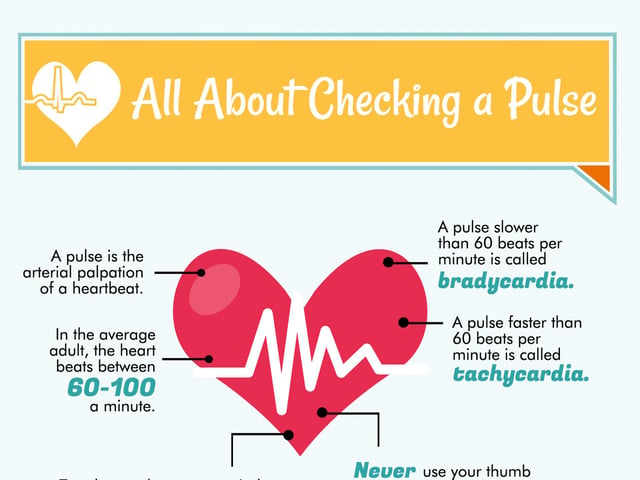
All About Checking a Pulse
What is a Pulse?
A pulse is the arterial palpation of a heartbeat. In the average adult, the heart beats between 60-100 a minute, though the resting rate can vary from person to person. In a healthy individual, the rate is lower at rest and higher when the body is engaged in physical activity.
A pulse slower than 60 beats per minute is called bradycardia.
A pulse faster than 100 beats per minute is called tachycardia.
To take a pulse, use your index and medial finger and count the number of palpitations you feel for a full minute. You can also count the beats for 30 seconds and multiply the number by two for the same result in less time. Never use your thumb to check a pulse as it may cause you to misinterpret your own pulse as that of your patient.
Where to Take a Pulse
The wrist (radial pulse)
This is the most popular location to check a pulse. To find it, place your fingers on the patient’s wrist, just under their thumb.
The foot (pedal and posterior tibial pulses)
Pedal pulses can be difficult to locate. You can find them on the top/mid portion of the foot, as well as behind the inner ankle bone
The groin (femoral pulse)
Femoral pulses are located where the leg meets the trunk. They can be difficult and uncomfortable to locate due to their very personal location.
The head (temporal pulse)
The temporal pulse is located in front of the ears on either side of the head
The neck (carotid pulse)
The carotid pulse can be found under the jaw on either side of the face
The knee (popliteal pulse)
This pulse is located behind your knee and can be very difficult to locate on yourself.
The elbow (brachial pulse)
On adults the brachial pulse can be found on the inside of the elbow.

Keep Reading

Certified Nursing Assistant Exam Blog
How Long Does it Take to Become a CNA?
As a profession on the frontline of healthcare, Certified Nursing Assis…

Certified Nursing Assistant Exam Blog
How to Do Well on the CNA Skills Test
Over 1.3 million nursing assistants work in our healthcare system today…

Certified Nursing Assistant Exam Blog
What Does a Nursing Assistant (CNA) Do?
Are you interested in exploring medical careers? The healthcare industr…